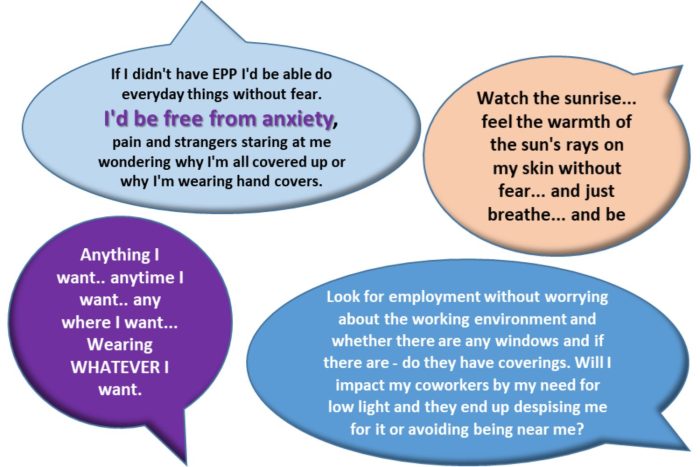How to Attend College With Porphyria on the Personal Syllabus
Avoiding the sun is but one out-of-class requirement for this teen with EPP
Written by |

We recently returned from a college visit for my youngest son, Brady, who lives with erythropoietic protoporphyria (EPP), an ultrarare disease characterized by extremely painful phototoxic reactions to sun exposure. I can’t believe we’re already looking at college!
Wasn’t I just prepping his kindergarten teacher to help manage his rare disease? At that age, he had to be prepared for concerns such as fire drills, recess, and field trips. We provided protective clothing, an emergency umbrella, and priority seating away from dangerous windows where his archenemy — the sun — always seemed to find him.
Most columns or blogs I peruse about this pre-collegiate stage of life describe the travails of sending a child off to school. The topics range from helping your offspring successfully fly the coop to managing an empty nest at home. None of them cover the concerns that Brady faces.
Most college visits start with an information session, followed by a campus tour, with an exuberant guide walking expectant students through the grounds and buildings. Having been through this process a couple of times already, I know what to expect.
The sessions often start with the typical questions, like “Where are you from?,” “What do you want to study?,” and “What brings you to fill-in-the-blank university?” Wide-eyed high schoolers and their parents ask about admissions, programs, extracurriculars, and so on — but never “Do you think I can manage this college while avoiding the sun?”
Navigating the campus tour, especially in midsummer, is extra special. The tour guides inevitably stop in the bright sun to discuss dorm rooms and meal plans. Brady finds the random tree, barrier, or sliver of shade or will rely on his gloves and long sleeves to protect him so he can focus on his future rather than his next safe space.
Selecting a college is an adventure in the best of circumstances. Add in a phototoxic disease with difficult symptoms and it’s sure to bring new considerations to this process. Thinking ahead to how he will manage all this on his own on a college campus tugs on my mama heartstrings.
On this campus tour, I found myself really, really wishing that he didn’t have to manage this disease and that I could just take this for him so he could live without the constant threat of impending pain. I pray for him to live free from the exhaustion of always being on high alert for the sun.
I was reminded of a survey I did a couple of years ago. I polled the EPP patient community, posing the question, “What would you do if you were free from EPP?” I could barely blink before I had dozens of responses.
Some were dreamy, like “Go to Fiji!” But most responses regaled typical daily activities that most of the world takes for granted: “get the mail,” “dress like a normal teenager,” and “volunteer at my child’s school.” The most poignant responses showed the true impact of EPP:
“I would live.”
“I’d be free from anxiety.”
“It would literally be a second birth. I would emerge.”

What the EPP community would do if they were free of their disease. (Graphics by Kristen Wheeden)
I suspect that Brady’s response to this question, after our recent visit, would be to have the ability to go to college without thinking about the sun. We’re working toward that for him and others with EPP with access to therapeutics — to live free at whatever stage of life they’re in: the child heading to kindergarten, the parent wanting to enjoy their kid’s events, the teenager heading off to college, or the fully grown adults seeking a typical life.
Though Brady knows we’ll find a way for him wherever he wants to go, there’s that little space in my heart that knows the path isn’t a simple one, and he’ll undoubtedly be affected in new and different ways when he sets off in his life. Maybe someday he’ll even be leading one of those campus tours without a worry about where in the sky the sun is lurking!
Note: Porphyria News is strictly a news and information website about the disease. It does not provide medical advice, diagnosis, or treatment. This content is not intended to be a substitute for professional medical advice, diagnosis, or treatment. Always seek the advice of your physician or other qualified health provider with any questions you may have regarding a medical condition. Never disregard professional medical advice or delay in seeking it because of something you have read on this website. The opinions expressed in this column are not those of Porphyria News or its parent company, Bionews, and are intended to spark discussion about issues pertaining to porphyria.







Leave a comment
Fill in the required fields to post. Your email address will not be published.